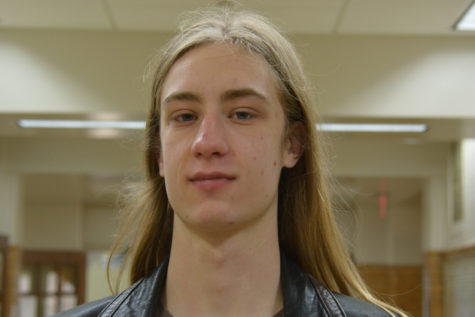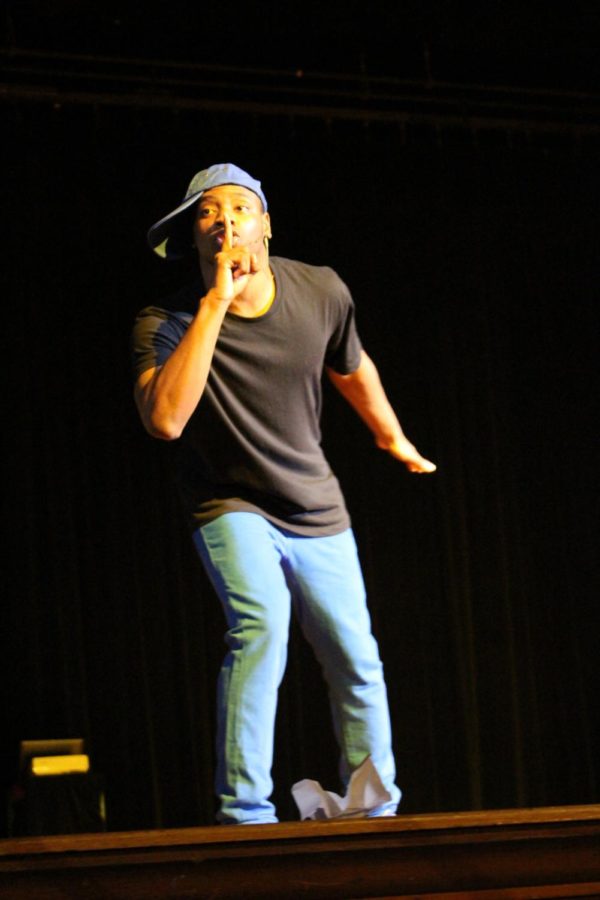Black History Poets Reflect on Performance
You saw Jacob Cunningham, Chauncey Williams-Wesley, and Norel McAdoo star in “Ricky v. June” in the Black History Program. You stood and applauded and just barely kept back the tears like everyone else. Now get ready for an exclusive look into their motivations and their feelings about the performance. (Photo by Annalise Novicky)
Jacob Cunningham, the poet
Jacob originally wrote “Ricky vs. June” for a poetry contest, and he was inspired by his friends.
“I have friends–I was friends with them but they weren’t friends with each other–and they were always into it, always,” Jacob said. “I was inspired by what I see on a day-to-day basis. I see people beefing every day. It’s really not necessary.”
Poetry is important to Jacob because it allows him to speak out.
“It lets me have a voice,” Jacob said. “If I’m just talking to people, they’re going to hear me, but they’re not going to listen. I feel like with poetry, I can inform people on things they need to know about.”
He also uses his poetry to give a voice to people who don’t have one.
“I can get people to feel for them,” Jacob said.
When he writes, he starts with a few pithy, catchy lines, like the Michael Jackson references and the line “We know y’all ain’t on track so we gone do y’all a favor and take y’all back,” and then goes from there.
“I start with a punchline and how I can put that in a poem, and the ideas start flowing,” Jacob said.
He was surprised by the overwhelmingly positive reaction the audience had.
“Man, I felt great,” Jacob said. “I expected a couple oohs and aahs, but the way they reacted I did not expect. And after the show my Instagram blew up. My phone messages blew up . . . People came up to me and said I had inspired them to do poetry. It’s a dream come true, and I definitely want to do it again.”
Jacob is certain that poetry will be a part of his life in the future.
“I mean, the moment that poetry to me is not fun, I’m going to stop doing it,” Jacob said. “But I don’t see that happening.”
“Ricky v. June” contains an important message for all of us, especially when we get caught up in things that really don’t matter.
“Nothing in life matters but your happiness, and the only way you’re going to get to that happiness is through love,” Jacob said.
Norel McAdoo as “June”
Norel was very satisfied with the way the production went.
“It had a good flow to it,” Norel said.
He appreciated working with Jacob and Chauncey on the poem that Jacob originally wrote.
“It was really cool that he gave it to us so we could up it even more,” Norel said.
The three of them were working on the choreography and delivery long before the actual performance.
“Everything was original,” Norel said. “We put in a lot of hard work and we had to practice.” Norel talked about how they allowed the performance to flow organically and were responsive to their audience, which encouraged them to continue.
“You can tell when somebody likes it and you feed off of that energy,” Norel said.
Chauncey Williams-Wesley as “Ricky”
Chauncey was pleased with his first and last appearance in the Black History Program.
“It was a lot of fun–you’re able to see three different perspectives,” Chauncey said. “Jacob brings that street perspective, Norel’s funny, he makes you laugh; I’m more like the wise guy.”
He believes that the performance got the reception it deserved.
“Overall, we got a lot of positive feedback,” Chauncey said. “I think with that poem there’s a bit of controversy, though it’s not necessarily negative.” He enjoyed working on the poem and its choreography to integrate it into the performance, saying that his favorite part of the choreography was the “Smooth Criminal” reference.
“We did have to edit it to make it more theatrical, so to speak,” Chauncey said. He thanked the McAdoo family for helping him develop as a poet.
“They kinda took me under their wing and showed me the ropes,” Chauncey said. “I’m grateful to have had the opportunity to make my mark.”





